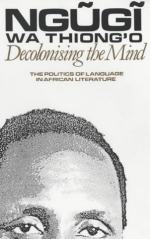|
This section contains 767 words (approx. 2 pages at 400 words per page) |

|
Summary
In Part IV, Ngũgĩ explains how African printing presses and publishing houses were controlled by British imperialists, which therefore restricted African content. With the rise of universities and colleges in Africa at beginning of 50s, departments dedicated to study of English also sprang up so that the only literary tradition on the continent became the Afro-European novel.
Sitting in Cell 16, Ngũgĩ had a choice to make: to follow in the steps of the Afro-European novel, which he explored in his earlier works, or to break into a new form of the African novel. He decided on the latter. Having been imprisoned for writing a play in Gĩkũyũ, Ngũgĩ resolved to write a novel in Gĩkũyũ.
In Part V, Ngũgĩ goes over the many questions he faced during his career...
(read more from the Chapter 3 (Parts IV-VI): The Language of African Fiction Summary)
|
This section contains 767 words (approx. 2 pages at 400 words per page) |

|




